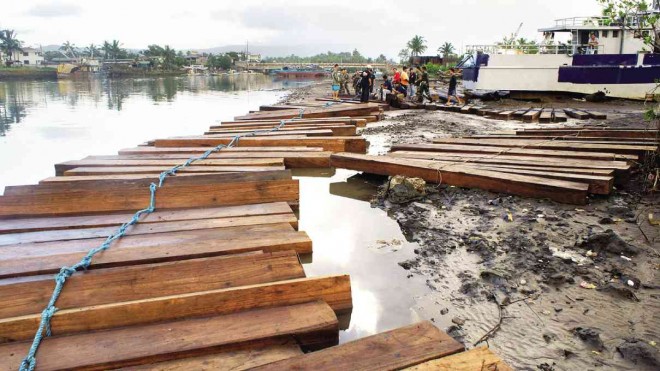
A FILE photo of illegally cut logs from Sierra Madre found abandoned in Mauban, Quezon province. CONTRIBUTED PHOTO
LUCENA CITY—The Sierra Madre mountain ranges, where the country’s virgin forest remains, have become vulnerable to the looming threat posed by the El Niño weather phenomenon due to continuing extraction of its resources.
Fr. Pete Montallana, president of Save Sierra Madre Network Alliance, said “the Great Sierra Madre seemed to have become vulnerable to El Niño which it survived 17 years ago.”
“This is attributed to the continuous fragmentation of its forests and various ecosystems due to logging, large extractive industries such as mining, road building and conversion to agricultural and settlement areas,” Montallana, a Franciscan priest and known defender of Sierra Madre mountain ranges, said in a statement sent to the Inquirer on Sunday.
The Philippine Atmospheric, Geophysical and Astronomical Services Administration (Pagasa) warned that the country would face severe drought starting October, when the prevailing El Niño becomes intense, which is expected to surpass the episode 17 years ago.
During the 1997 to 1998 El Niño, 70 percent of the country experienced severe drought that caused water and food shortages.
Montallana recalled that Sierra Madre was the only area that did not suffer rain deficit because of its topography with the existence of large tracts of intact rainforest in the mountain range.
He also noted how the mountain range and its forests served as protective barrier against storms and cyclones coming from the Pacific Ocean.
“All storms that have passed through this range have weakened in terms of wind speed (strength),” Montallana said.
The priest said the Sierra Madre had long been the source of water supply of Metro Manila through the Angat and Umiray watersheds.
“This mountain range provides for our water needs, it also plays a role in minimizing the impacts of typhoons, floods and other disasters. That was the time when Sierra Madre experienced wholeness,” he said.
The Sierra Madre is a continuous landscape that covers the provinces of Cagayan, Isabela, Nueva Vizcaya, Nueva Ecija, Quirino, Aurora, Quezon, Rizal, Laguna and Bulacan.
In September 2012, President Aquino declared Sept. 26 of every year “Save Sierra Madre Day” to step up efforts to rehabilitate, reforest, protect and conserve the mountain ranges.
But various plans by the government and the private sector in the Sierra Madre threatened the success of Aquino’s declaration.
Montallana lamented that the Sierra Madre’s ecosystems are left in patches and isolated due to the so called development projects, logging and mining, among others.
“We call on the government to stand up against those blinded by greed and do not see Sierra Madre as a mother who also need to be nourished,” the priest said.
He also called on the people to take up the challenge of Pope Francis on climate change.
“The heat, the drought and the rains are here—alarming signs that we are headed towards a very critical period, putting in grave danger the next generation. We need to wake up, be aware of our connection and relationship with nature and act especially since the government is dragging its feet,” he said.